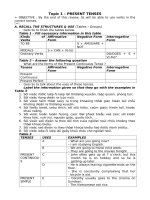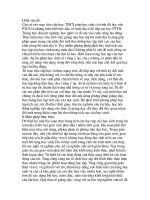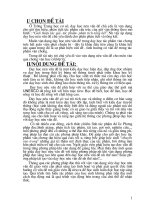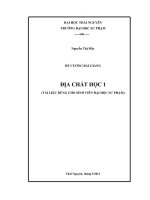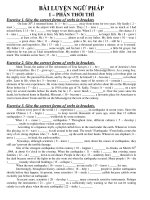Ngữ pháp 1 nguyễn thị kiệp
Bạn đang xem bản rút gọn của tài liệu. Xem và tải ngay bản đầy đủ của tài liệu tại đây (356.7 KB, 44 trang )
TRƯỜNG ĐẠI HỌC NHATRANG
KHOA NGOẠI NGỮ
BÀI GIẢNG
MÔN NGỮ PHÁP 1- B2
COMPILED BY: NGUYỄN THỊ KIỆP, MA.
AUGUST, 2011
CHƯƠNG TRÌNH NGỮ PHÁP 1 - BẰNG 2
1. Số tiết: 45 tiết
2.Trình độ: sinh viên đã có trình độ đại học một chuyên ngành khác.
3. Điều kiện tiên quyết: sinh viên đã đạt được trình độ tiếng Anh sơ cấp (Elementary)
4. Mô tả học phần : Học phần dành cho sinh viên bằng 2 năm thứ nhất, cung cấp cho sinh viên
các thì trong tiếng Anh, và các dạng câu.
5. Mục ti êu học phần: Sau khi học xong học phần này sinh viên có khả năng sử dụng đúng các
trật tự từ trong câu để có thể đọc hiểu và viết được những câu đơn giản đúng chính xác.
6. Tài liệu tham khảo
TT
Tên tác giả
Tên tài liệu
1
George Yule
Oxford Practice
GrammarAdvanced
2
3
4
5
Năm
xuất
bản
Nhà
xuất bản
Địa chỉ
khai thác
tài liệu
2006
Oxford
University
Press
Mark Nettle Developing
and
Diana Grammar in
Hopkins
Context
2003
Cambridge Nhà sách
University
Press
Ronald
Carter,
Rebecca
Hughes and
Michael
McCathy
George Stern
2000
Cambridge Nhà sách
University
Press
x
2008
Learners
Publishing
Pte Ltd
Nhà sách
x
1998
Oxford
University
Press
Nhà sách
x
Exploring
Grammar in
Context
An Outline Of
English
Grammar
A.J.Thomson A Practical
A.V.Martinet English
Grammar
Nhà sách
Mục đích
sử dụng
Tham
Học
khảo
x
x
7. Nội dung chi tiết học phần
Nội dung
Chương 1: Giới thiệu: Việc học Ngữ pháp &
các thuật ngữ của ngữ pháp ( Grammatical
Terms)
Chương 2: Các Thì (Tenses)
1. Hiện tại đơn (The present simple)
2. Hiện tại tiếp diễn (The present
continuous)
3. Qúa khứ đơn ( The past simple)
4. Qúa khứ tiếp diễn ( The past continuous)
5. Hiện tại hoàn thành ( The present perfect
simple)
6. Hiện tại hoàn thành tiếp diễn (The present
perfect continuous)
7. Qúa khứ hoàn thành (The past perfect
simple) & Qúa khứ hoàn thành tiếp diễn
(The past perfect continuous)
8. Tương lai gần & Tương lai đơn ( Near
future & The future simple)
9. Tương lai tiếp diễn ( The future
continuous) &Tương lai hoàn thành ( The
future perfect simple ) &Tương lai hoàn thành
tiếp diễn ( The future perfect continuous)
Tài liệu
Chương 3: Các dạng câu
10. Câu tường thuật (Reported speech)
11. Câu điều kiện ( Conditional sentences)
12. Dạng bị động ( Passive voice)
2
Ths Nguyễ n Thị Kiệp
2-5
Số tiết
3
2
2
7-11
12-17
3
3
2
2
2
18-22
23-33
35-40
3
3
3
2
41-46
3
2
47-52
3
1
20-21
2
53-57
2
63-67
2
1
63-67
24-27
1
148-159
107-117
2
2
1
2
1
Written Test + Correction
GIẢNG VIÊN BIÊN SOẠN
Trang
139-150
184-195
151-172
56-67
3
3
4
4
4
3
TRƯỞNG BỘ MÔN
Ths Lê Hoàng Duy Thuần
Q.TRƯỞNG KHOA
Ths. Nguyễn Thị Thúy Hồng
TABLE OF CONTENT
Chương 1: Giới thiệu : Việc học Ngữ pháp & các thuật ngữ của ngữ pháp
( Grammatical Terms)
Chương 2: Các Thì (Tenses)
1. Hiện tại đơn (The present simple)
2. Hiện tại tiếp diễn (The present continuous)
3. Qúa khứ đơn ( The past simple)
4. Qúa khứ tiếp diễn ( The past continuous)
5. Hiện tại hoàn thành ( The present perfect simple)
6. Hiện tại hoàn thành tiếp diễn (The present perfect continuous)
7. Qúa khứ hoàn thành (The past perfect simple)
& Qúa khứ hoàn thành tiếp diễn (The past perfect continuous)
8. Tương lai gần & Tương lai đơn ( Near future & The future simple)
9. Tương lai tiếp diễn ( The future continuous)
& Tương lai hoàn thành ( The future perfect simple )
& Tương lai hoàn thành tiếp diễn ( The future perfect continuous )
Chương 3: Các dạng câu
10. Câu tường thuật (Reported speech)
11. Câu điều kiện ( Conditional sentences)
12. Dạng bị động ( Passive voice)
Written Test & Correction
CHAPTER I:
INTRODUCTION
GRAMMATICAL TERMS
1. NOUNS AND RELATED WORDS:
Noun : this is usually the name of a thing, place or a person
Ex: table, London, David.
Nouns can be countable with a singular and a plural (ex: book, books) or
uncountable ( ex: sugar, bread, work, information, etc.)
+ Pronoun (ex: I, he, she, it, we, you, they, him, us, etc.)
+ Adjective (ex: nice, hot, small, blue, etc.)
+ Possessive (ex: my, his, our, their, etc.)
+ Article ( ex: the, a/an)
2. VERBS AND RELATED WORDS
+ Main verb (ex: He lives in Nha trang.)
+ Auxiliary verb ( be, do, have)
+ Modal verb ( can, could, will, would, may, might, should, etc.)
+ Active verb ( ex: Mary opened the parcel.)
+ Passive verb (ex: The parcel was sent three days ago.)
+ Infinitive ( ex: to go, to eat, to write, etc.)
+ Imperative (ex: Come here. Put on your shoes, please.)
+ Adverb (ex: well, badly, carefully, etc.)
+ Tag question (ex: It’s very hot today, isn’t it ?)
+ Subject/ Object/ phrase/ clause/ sentence
3. OTHER WORDS ABOUT GRAMMAR
+ Contraction ( I’d , It’s, we’re ,etc.)
+ Comparative ( hotter, smaller, more comfortable, etc)
+ Superlative ( the hottest, the most beautiful, etc)
+ Preposition ( in, on , by, with, at, etc)
+ Conjunction ( and, but, or, etc.)
+ Reported speech:
ex: He said that he would like to be president.
Match the underlined words in these sentences to the grammatical terms below.
a. I will show you the easiest way to use it.
b. My book is on the table.
c. Rice is grown in China.
d. She told me to go to the beach.
e. He is nice, isn’t he?
f. You try to use the new grammar, but make some mistakes.
g. You notice some new grammar that you haven’t seen before.
h. Go back to your seat, please.
i. You read about the grammar again to understand it better , and then you can
use it correctly.
j. You try to understand the meaning of the new grammar.
1. reported speech _____________________
2. contraction _________________________
3. preposition __________________________
4. passive verb ________________________
5. comparative ________________________
6. adjective ___________________________
7. infinitive ___________________________
8. adverb ____________________________
9. superlative ___________________________
10.tag question _________________________
11.plural noun __________________________
12.modal verb __________________________
13.article ______________________________
14.possessive __________________________
15.conjunction _________________________
16.main verb __________________________
17.imperative __________________________
18.pronoun ____________________________
CHAPTER II: TENSES
1. THE PRESENT SIMPLE
Read what Ann says about her weekends.
On Fridays I come home from the BBC at about 2.00 in the afternoon
and I just relax.
On Friday evenings I don’t go out, but sometimes a friend comes for dinner.
He or she brings the wine and I cook the meal. I love cooking! We listen to music
or we just chat.
On Saturday mornings I get up at 9.00 and I go shopping. Then in the
evenings I sometimes go to the theatre or the opera with a friend. I love opera!
Then we eat in my favourite Chinese restaurant.
On Sunday... Oh, on Sunday mornings I stay in bed late, I don’t get up until
11.00! Sometimes in the afternoon I visit my sister. She lives in the country and
has two children. I like playing with my niece and nephew, but I leave early
because I go to bed at 8.00 on Sunday evenings!
Grammar questions
1. Find 4 verbs which end in –s. Why do they end in –s ?
Notes: Rules of present simple:
+ In positive: in the third person singular with he, she, and it
* Most verbs add - s
ex: He gets up at 6.00 in the morning.
* If verbs end in – o, - ch, - sh, -s , add + es after the verb.
Ex: She goes to school on Sunday./ He watches football match on TV.
*Verbs end in –y:
vowel- y: verb + s
ex: He plays football on the beach.
Consonant –y : y---->i+ es
Ex: She studies English well.
- with I, we, you , and they, we don’t put –s /-es after the verb.
Ex: I/ We/ You/ They get up early.
2. Find 2 negatives.
+ In negative:
with I, we, you , and they, the negative is don’t + infinitive
with he, she, and it, the negative is doesn’t + infinitive
ex: I/ You/ We/ They don’t go to school on Sunday.
He/ She doesn’t get up early.
In question:
Ex: Do I/you/ we/ they go to school on Sunday?
Does he/she go to school on Sunday?
USES: The Present simple is used to express:
1. a habit.
Ex: I usually get up at 5.00.
2. a fact which is always true.
Ex: I come from Vietnam.
3. a fact which is true for a long time.
Ex: He works in a bank.
She lives in Nhatrang.
Notes: Using the present simple with:
- Have/ Have got
- There is + singular noun/ uncountable noun
- There are + plural noun
- CAN + verb ( infinitive) : to express a present ability
EXERCISES
1. Turn these sentences into negatives and questions.
a. My mother works in the hotel.
__________________________________
b. My father watches TV in the evening.
_____________________________________
c. Peter lives with his parents.
______________________________________
d. Sally and Tim live in Madrid.
______________________________________
e. We have dinner at 7.00.
______________________________________
f. Our school has a lot of students.
_______________________________________
g. They want to buy a new house.
_______________________________________
h. He likes listening to music.
_______________________________________
i. Ann plays football with his nephew.
_______________________________________
j. Mary studies maths at high-school.
_______________________________________
2. Do exercises 1, 2& 3 p. 9&10 in the course book.
3.Complete the text with the correct form of the verbs in the box.
“ My weekends are fast and exciting. My weekdays are fast and domestic! I
____(1) two sons, Dylan, 7, and Dakota, 5. Every morning I ____(2) one hour
before them, at 6.00, and I ____(3) to the gym. I____(4) home and I _____(5)
breakfast, then I _____(6) them to school. On Mondays I always ______(7). I
______(8) all the food for the week. I often ____(9) dinner in the evenings, but
not every day because I don’t ______(10) cooking. Fortunately, my husband,
Don, _____(11) cooking. On Tuesdays and Thursdays I _____(12) my father.
He ____(13) on the next block. Every afternoon I ______(14) the kids from
school. In the evenings Don and I usually ______(15) , but sometimes we
_____(16) friends. We never ______(17) on Friday evenings because I
____(18) work so early on Saturdays.”
love / relax / have / like / go / live / start / come / visit (2) / go shopping/
pick up/ go out / get up/ take / make / cook / buy
4. Find the mistakes and correct them.
a. London is a city very big.
b. My mother works in a hotel is a receptionist.
c. My father watch TV in the evening.
d. He’s like watching football.
e. On Sundays we go in a restaurant.
f. Hans is businessman.
g. You family is very nice.
h. I like listen to music.
i. Our school have a lot of students.
j. The childrens go to school near here.
k. We have the dinner at 7.00.
l. Buses in London are reds.
m. My mother no have a job.
n. Do you want a ice-cream?
o. Is near here, my flat.
p. My brother go to university.
q. English is a language international.
r. I don’t can go out because I have a lot of homework.
s. In the kitchen is a table.
t. My children like they’re school very much.
u. Italian people is very artistic.
v. I like cities because I can to go to the theatre.
w. There are some flower in the living room.
x. Is there Indian restaurant near here?
2. THE PRESENT CONTINUOUS
Read the conversation below and then find the sentences using
“ be + verb- ing”.
Anne: Hello, Linda. Is Jack here?
Linda: No, he isn’t.
Anne: Is he working today?
Linda: No, he isn’t working today. He’s in the kitchen.
Anne: What’s he doing?
Linda: He’s cooking.
Anne: What are you doing?
Linda: I’m reading.
The Present Continuous
1. Form: is/am/are + verb-ing
Ex: What are you doing now?
I’m writing now.
2.Uses: The Present continuous is used to express:
+ an activity happening now ( at the moment of speaking )
Ex: They’re playing football in the street.
She can’t answer the phone because she’s washing her hair.
+ an activity happening around now, but perhaps not at the moment of
speaking.
Ex: He’s studying maths at university.
+ a planned future arrangement.
Ex: I’ m meeting her at 9 o’clock tomorrow.
+ a temporary situation
ex: She’s living with her friends until she can find a new flat.
Notes: * Spelling
+ Most verbs add –ing
Ex: work – working
read - reading
+ verbs end in –e , omit –e before adding – ing.
Ex: write - writing ; dance - dancing
Exception: * - to see - seeing
- to dye – dyeing
* - to lie - lying ; to die - dying
+ Verbs end in a single consonant following a single vowel, double the
consonant before adding – ing.
Ex: run – running
get - getting
* Some verbs are not usually used in the continuous, such as: like, hate,
want, need, prefer, love, agree, understand, believe, remember, think, see, hear,
smell, taste, sound, etc. because they do not describe activities.
EXERCISES
I. Choose the correct form of the verb for these sentences:
1. You’re very quiet. What ( do you think/ are you thinking) about?
2. What (are you thinking/ do you think) about the new sports centre?
3. I’m sorry(I’m not agreeing/ I don’t agree) with you.
4. (Are you looking/ Do you look) for me?
5. (Do you prefer/ Are you preferring) walking to cycling?
6. (I don’t like/ I’ m not liking) him at the moment.
7. (I hear/ I’m hearing) you’re leaving us.
8. I’m afraid (I’m not remembering / I don’t remember) where we met.
9. (Do you listen/ Are you listening) to the radio at the moment?
10. (I’m hating/ I hate) cold evenings.
11. (I’m not looking forward/ I don’t look forward) to my holiday.
12. (They’re looking/ They look) at clothes at the moment.
13. What (is this meaning?/ does this mean?)
14. (He knows/ He’s knowing) you’re wrong.
15. (They watch/ They’re watching) us.
II. Put the verbs in brackets into the correct tense.
1. I (live)____ in Washington, though I (stay)_____ in London at the moment.
2. I (come)____ from Scotland, though I (live)_____ in London just now.
3. They usually (work)____ at the weekends, though they____ (not work) at
the moment.
4. He (teach)______ in a language school, though he (work)____ in a factory
at the moment because the school’s on holiday.
5. I (study)_____ French at the moment, but I (not speak)_____ it very well
yet.
III. Write the conversation, putting the verbs into the present simple or present
continuous.
A: Where (1)____(you/ come) from?
B: Brazil. What about you? Where (2)_____ (you/ come) from?
A: Italy. I’m in London for one month.
B: Yes, me too.
A: (3)___ (you/ like) it here in London?
B: It’s very exciting but sometimes the people (4)____ (not/be) very friendly.
A: (5)_____ (you/stay) with English people?
B: Yes, I (6)___ (stay) with an English family, but I (7)____ (not see) them very
often. They (8)___ (be) always busy.
A: I (9)___ (stay) in a student hostel. That (10)___ (be) much better. There are
many different nationalities and we all (11)____ (speak) English together.
B: Oh, that’s good. And (12)___ (you/ study) together in the hostel in the
evenings?
A: Yes, sometimes.
IV. Do exercises 1, 2,& 3 p.15&16 in the course book.
3. THE PAST SIMPLE
Read the conversation and the text and then answer the questions .
A
Kim: Were you at Charlotte’s party last Saturday?
Max: Yes, I was.
Kim: Was it good?
Max: Well, it was OK.
Kim: Were there many people?
Max: Yes, there were.
Kim: Was Henry there?
Max: No, he wasn’t. And where were you? Why weren’t you there?
Kim: Oh...I couldn’t go because I was at Mark’s party! It was brilliant!
B
Roy Weston is an explorer. He’s crossing Antarctica. Yesterday, he visited a
famous place. Major Campbell, the famous British explorer, stayed there in 1921
with five of his men. They were there for six weeks. They didn’t move because of
the weather. The Antarctic winter killed them. Roy has got a book about Major
Campbell. In the book, there is a picture of a note. Campbell wrote it. He died the
next day.
1.Find main verbs in the conversation and in the text.
2.Which verbs are not in the past simple?
3.Find the negatives.
THE PAST SIMPLE
I. Forms: - to be : was/ were
- can - could
- ordinary verbs : + regular verbs: V – ED
+ irregular verbs: go- went, have- had, do- did,
got, make- made, say- said, tell- told, etc.
1. To be
Positive:
I was here yesterday.
Negative:
I wasn’t here yesterday.
Question:
Were you here yesterday?
Notes: - I/ he/ she/ it was / wasn’t
- we/ you/ they were / weren’t
2. Could + verb(infinitive) -----> a past ability
ex: He could swim when he was ten.
He couldn’t type when he was ten.
Could you cook when you were ten?
get-
3. Ordinary verbs
Regular verbs
Positive: He worked hard at school.
Negative: He didn’t work hard at school.
Question: Did he work hard at school?
Irregular verbs
She went to China last summer.
She didn’t go to China last summer.
Did she go to China last summer?
Notes: - I/you/ he/she / we/ they didn’t +verb(infinitive)
- Did I/you/ he/she / we/ they +verb(infinitive) ?
- Spelling: verb-ed
a. Most verbs add –ed
Ex: work- worked, help- helped
b. Verbs end in a single consonant, following a single vowel, double the
consonant before adding –ed.
Ex: stop – stopped , drop – dropped
c. Verbs end in – e, add –d after the verb
Ex: change – changed, arrive – arrived, dance – danced
d. Verbs end in – y
+ consonant – y -----> i+ ed
ex: study – studied , carry – carried, cry – cried
+ vowel –y ----> + ed
ex: play – played
- Adverbs of time : ago, yesterday, last, etc.
II.USES: The Past simple is used to express:
1.a completed action in the past at a definite time.
Ex: I worked in the hotel three months ago.
2.a past habit.
Ex: He used to swim in the river when he was young.
EXERCISE
I. Turn these sentences into negatives and questions.
1.We were at school last Saturday.
2. He wanted a new bag last week.
3. They went out of the house yesterday afternoon.
4. She had dinner with her parents last night.
5. Tom did all his homework yesterday morning.
6. My English teacher got a bad cold last week.
7. They bought a lot of fruit and vegetables.
8. All of them stood on the stage and sang a merry song last year.
9. We cut the white sheet of paper into small pieces.
10. My father put these books into the box.
II. Complete the text, using the past simple form of these verbs: look, earn,
work, love, learn, marry, die, hate, and want.
“ I ____(1) from 6.00 in the morning until 10.00 at night. Sixteen hours in the
cotton fields and I only ___(2) $ 2 a day. I sure ____(3) that job but I ____(4) the
poem in my head. I really ___(5) to learn to read and write. When I was sixteen I
_____(6) Hubert, and soon there were six children, five sons, then a daughter, Lily.
Hubert ___(7) just before she was born. That was sixty- five years ago. So I
____(8) after my family alone. There was no time for learning, but my children,
they all____(9) to read and write – that was important to me. And when did I learn
to read and write? I didn’t learn to read and write until I was 86, and now I have
three books of poems.”
Complete the text, using the past simple form of these verbs: come, ride, send,
go, take, see, write, shine, bring, meet and be.
Alan ___(1) to Egypt last summer. He ___(2) a lot of people there. He ___(3) a lot
of letters, and ____(4) them to all his friends. The sun ___(5) nearly every day. It
___(6) very hot. He ___(7) the Great Pyramid, and he ___(8) on a camel. He
____(9) a lot of photos. He ___(10) home by British Airways. He ___(11) a lot of
souvenirs with him.
III.Some of these sentences are wrong? Find them and correct them.
1.Her parents go to Italy last year.
2.The moon goes round the earth.
3. Are you believing in God?
4. I’m usually going to work by car.
5.Look! Somebody is climbing up that tree over there.
6. I’m thinking it would be a good idea to leave early.
7. They moved to Nha trang three years ago.
8. The government is worried because the number of people without jobs is
increasing.
9.Can you hear those people? What do they talk about?
10.Look! That man tries to open the door of your car.
IV. Do exercises 1, 2, 3, & 4 p. 20, 21, &22 in the course book.
4. THE PAST CONTINUOUS
Read the text and answer the questions.
Two cars were going along Cambridge Street. An Englishman was driving a
Rolls- Royce, and a foreign student was driving a V.W. The Englishman was
driving slowly and carefully. The student wasn’t driving carefully... he was
looking at a girl. She was walking along the street. She was wearing a short
skirt, and she was carrying a handbag. The traffic-lights were green. A dog was
sitting beside the traffic-lights. A cat was sitting on the opposite corner.
1.How many people are there in the text? Who are they?
2.What were they doing?
3. How many animals are there in the text? What are they?
4.What were they doing?
5.What do you think happened in this street?
6. What tenses are used in the text? What are they?
THE PAST CONTINUOUS
I.Forms: WAS/ WERE + V- ING
EX: I was watching TV at 10 o’clock yesterday.
II.Uses:
a. The past continuous is used to express an action that had already started
before this time but hadn’t finished .
EX: What were you doing at 9 o’clock yesterday?
We were playing football at 9 o’clock yesterday.
b. The past continuous does not tell us whether an action was finished or
not.
Ex: Tom was cooking dinner.( He was in the middle of cooking dinner and
we don’t know whether he finished cooking it.)
c. We often use the past simple and the past continuous together to say that
something happened in the middle of something else.
Ex: When he arrived home, I was having dinner.
When I got up, it was raining.
EXERCISES
I .Correct the verb form in parentheses.
1.George (fall) off the ladder while he (paint) the ceiling.
2.Last night, I (read) in bed when suddenly I (hear) a scream.
3. you (watch) TV when I (phone) you ?
4. Ann (wait) for me when I (arrive).
5. I (not drive) very fast when the accident (happen).
6.He (sit) on the bank fishing when he (see) a man’s hat floating down
the river.
7. I (live) in France when the second world war (begin).
8. He (walk) across the bridge when his hat (blow) off.
9. A boy (jump) off the train while it (move).
10.The light (go) out while we (have) dinner.
11.While I (come) to work this morning, I (meet) an old friend.
12.I (not want) to get up this morning. It (rain) and it was cold, and
my bed was so warm.
13.I (listen) to the news on the radio when the phone (ring).
14. But when I (pick) up the phone, there was no one there.
15. I said “ Hello” to the children, but they didn’t say anything
because they (watch) TV.
II. Decide which is the correct verb form.
a. I saw/ was seeing a very good programme on TV last night.
b. While I shopped/ was shopping this morning, I lost/ was losing my
money. I don’t know how.
c. Last week the police stopped/ were stopping Alan in his car because he
travelled/ was travelling at over eighty miles an hour.
d. “How did you cut/ were you cutting your finger?
e. “I cooked/ was cooking and I dropped the knife.”
III. Do exercises 1, 2, &3 p. 25, 26, &27 in the course book.
5. THE PRESENT PERFECT SIMPLE
Read the conversation and tell us what tenses are used in it.
A: Where do you live, Olga?
B: In a flat near the park.
A: How long have you lived there?
B: For three years.
A: And why did you move?
B: We wanted to live in a nicer area.
I. FORMS :
HAVE/ HAS + PAST PARTICIPLE
Ex: I have opened the door.
He has closed the door.
Notes: - He/ She/It
has/ hasn’t + past participle
_ I / we/ you/ they have / haven’t + past participle
- Have
I / we/ you/ they
+ past participle ?
- Has
he/ she/it
+ past participle ?
II. USES: The present perfect simple is used to express:
1. an action which has just happened
ex: I have just opened my book.
Notes: Some adverbs are often used in the present perfect:
-“ just / already / never / ever” is put between “ Have/ Has” and past participle.
Ex: She has already finished her homework.
I have never seen a camel.
- “yet / recently / lately” is put at the end of the sentence.
Ex: Have you seen a new film recently?
I haven’t seen it yet.
2. an action which happened in the past and has continued up to the present.
Ex: I have studied English since 1990./ for 16 years.
Notes: - since : the start of the period of time
- for : a period of time
3. an action which happened in the past at an indefinite time.
Ex: I have read that book.
* Compare:
Have been to and Have gone to
Ex: 1. He has been to Paris.
2. He has gone to Paris.
Notes: in sentence (1), he went to Paris and returned. Now, he is here.
In sentence (2), Now, he isn’t here. He is in Paris or on the way to Paris.
EXERCISES
I. Since or for ?
a. Mary has been in London ____ March.
b. She’s worked for him ___ she left school.
c. I’ve lived here ____ three months.
d. We’ve been in Berlin _____ we were married.
e. I haven’t seen her _____ several years.
f. They have been married ____ 1990.
II. Been or gone ?
1. I’ve been to most countries in Europe, but I have never ___ to Russia.
2. Where’s Anne?
She’s ____ to work.
3. Sorry. I’m late. I’ve ____ stuck in a traffic jam for an hour.
4. You look very brown! Have you ______ on holiday.
5. Can I speak to Mr. David, please?
I’m sorry he’s just ____ out of the office.
6. John was here earlier but I think he has ____ now.
7. Paris is a wonderful city. I have ____ there many times.
8. Have you ever ____ to China?
“ No, never.”
9. Hello, Pat! Where have you ___ ?
I’ve _____ to the bank.
10. There’s a new restaurant in town. Have you _____ to it ?
III. Put the verb in brackets into the present perfect or past simple to complete
the story.
One Sunday evening two men (a)___ (meet) in a London pub. One of them
was very unhappy.
‘Life is terrible, everything in the world is really boring,’ he said.
‘Don’t say that,’ said the other man. ‘Life is marvellous! The world is so
exciting! Think about Italy. It’s a wonderful country. (b)____ you ever ___ (be)
there?’
‘Oh, yes. I(c)___(go) there last year and I (d)____(not like) it.’
‘Well,(e)____ you ___ (be) to Norway? (f) ____ you ever ___(see) the
midnight sun?’
‘Oh, yes. I (g)____(go) in 1984 and I (h) ___(see) the midnight sun. I
(i)___(not enjoy) it.
‘Well, I (j)_____ just _____(return) from a safari in Africa. (k)____ you
____(visit) Africa yet?’
‘Yes, I (l)___ (go) on safari in Africa last year and I (m)____(climb) Mount
Kilimanjaro. It was really boring.’
‘Well,’ said the other man, I think that you’re very ill. Only the best
psychiatrist can help you. Go to see Dr Green Baum in Harley Street.’
‘I am Dr Green Baum,’ answered the man sadly.
IV. Do exercises 1, 2,3,& 4 p.38, 39,& 40 in the course book.
6. THE PRESENT PERFECT CONTINUOUS
Read the conversation and find out the tenses.
Tom : Well, I’ve just finished college. I’ve been studying archaeology. And for
the last month I’ve been working as a postman.
Angela : And what are you doing in London?
Tom : I’m trying to find a job. I’ve been going round museums to see if they
need anybody. I’ve been writing letters for weeks.
Angela : Have you had any replies?
Tom : Well, a few, but not many. I’ve written at least thirty letters.
Angela : Poor old you! Look, let’s go and have a cup of tea, and catch up on some
more news.
Tom : What a lovely idea!
THE PRESENT PERFECT CONTINUOUS
I. Forms:
HAVE/ HAS + BEEN + V- ING
Ex: He has been walking in the forest all day.
II. Uses : The present perfect continuous is used to express:
1. an activity which continues to the present.
Ex: I have been learning English for two years.
2. an activity with a result in the present.
Ex: He is tired because he has been running too fast.
Notes: + Some verbs that express a state ( eg: like, love, know, have) are not found
in the present perfect continuous.
+ Some verbs don’t have the idea of a long time, for example: start, find,
lose, buy, stop, break, die. It’s unusual to see these verbs in the present perfect
continuous.
Ex: I have known him for several years.
Wrong: I have been knowing him for several years.
Compare the present perfect simple and the present perfect continuous.
Ex: 1. I have read 10 pages of this book.
2. I have been reading this book all day.
Notes: (1) the present perfect simple is used when the action is completed and is
used to emphasize the final achievement.
(2) the present perfect continuous is used to emphasize the action.
EXERCISES
I. Choose the correct verb form.
1.How long has Angela been living/ does Angela live in Paris?
2.She has been finding/ has found a good job.
3.Alan has been/ has gone to South America. He isn’t here.
4.Angela has bought/ bought her flat a few months ago.
5.How long has she known/ has she been knowing Peter?
6.Tom worked/ has been working as a postman for a month.
7.He has visited/ has been visiting ten museums today.
8.He’s tired because he has traveled / has been travelling around London all
day.
9.I have been writing / have written three letters today.
10. I have run / have been running six kilometres.
II. The Present Perfect simple or the Present Perfect continuous ?
Julia: It (be) busy this morning, hasn’t it?
Pat : Yes, you look exhausted. What you (do)?
Julia: I ( not stop) all morning. I (write) letters, (answer) the phone, (do) the
filling, .... It (be) impossible.
Pat: It (be) the same for me. My phone (ring) all morning, I (write) five
letters....and I (interview) three people for that secreterial job.
Julia: Have you? Oh, I (interview) one as well. And I (send) off another ten
application forms to people who want them. It seems to be very
popular.
III. Do exercises 1,2,3,& 4 p.44, 45,& 46 in the course book.
7. THE PAST PERFECT & THE PAST PERFECT CONTINUOUS
Read the story and find the tenses.
Marsha and Felix got married one Saturday in June. They had met only one week earlier at a
party and had fallen passionately in love. Marsha rang and told her parents her news after the
wedding, when Felix had moved into her flat. They were surprised and angry. Unfortunately,
after a few months, their marriage started to go wrong. Felix had met another woman...
THE PAST PERFECT
I. Forms: Had + past participle
Ex: When I got home, Anne had already cleaned the house.
II. Uses: The past perfect is used to express an action which happened before
another action in the past.
Ex: When I arrived at the airport, the plane had taken off.
THE PAST PERFECT CONTINUOUS
I. Form: Had + been + verb- ing
Ex: When he arrived in the city, the streets were wet because it had been
raining heavily.
II. Use: the past perfect continuous is used to talk about activities that
continued for a time.
Ex: After the match I had a sore throat because I had been shouting so much.
EXERCISES
I. Correct the verb form: past simple or past perfect.
A. 1. When the police (arrive), the car (go).
2. When I (get) to the shop, it (close).
3. They (eat) everything by the time I (arrive) at the party.
4. When we (leave) the beach, the rain (already start).
5. I (try) telephoning her several times but she (leave) the country.
6. When I (find) my purse, someone (take) the money out of it.
7. The car (go) when I (look) into the street.
8. The patient (already die) by the time I (see) her.
9. All the garages (close) by the time we (cross) the border.
10. ( you already leave) when the trouble (start)?
B.‘ When the old lady_____(1)(return) to her flat she _____(2)(see) at once that
burglars ____(3)(break) in during her absence, because the front door
____(4)(be) open and everything in the flat____ (5)(be) upside down. The
burglars themselves _____(6)(be) no longer there, but they probably ______(7)
(only just leave) because a cigarette was still burning on an ornamental table.
Probably they ____(8)(hear) the lift coming up and _____(9)( run) down the
fire escape. They ____(10)(help) themselves to her whisky too but there
____(11)(be) a little left, so she ____(12)(pour) herself out a drink. She
_____(13)(wonder) if they ____(14)(find) her jewellery and rather
_____(15)(hope) that they had. The jewellery _____(16)(be given) her by her
husband, who _____(17)(die) some years before. Since his death she
______(18)( not have) the heart to wear it, yet she _____(19)(not like) to sell
it.’
II. Write the verbs in the correct tense: past simple, past continuous, past
perfect or past perfect continuous.
1. When I phoned her, she _______(do) her homework.
2. I couldn’t open the office door because someone _______(lock) it.
3. I wanted to be the first to tell her the news, but I was too late. Someone
________(already tell) her.
4. We ______(wait) for three and a half hours when John finally arrived.
5. There was nobody at the office. Mr. Brown _____ (tell) the staff to go home.
6. We ______(travel) for about four hours when I realized that something was
wrong with one of the tyres.
7. Peter was cleaning the flat while John _____(make) dinner.
8. I had a pleasant surprise when I got to my room: someone _____(put) flowers
there for me.
9. I ______(use) the machine for some time when I realized that there was no
ink in it.
10. When he warned them about the police, they ____(leave) the country.
11. We _____(sit) in the sunshine for about twenty- five minutes when I
suddenly felt sick.
12. I couldn’t get into the car, because the children ______(hide) the car keys.
13. She paid for her ticket and _____(leave).
14. Peter and Jane ______(argue). I could hear them from my room.
15. I _____(lie) down on the bed and fell asleep.
III. Do exercises 2 & 3p.50 &51 in the course book.
8. NEAR FUTURE AND SIMPLE FUTURE
Read the conversation and find the tenses in it.
Jenny: Would you like a game of tennis next Thursday?
Chris: I can’t, I’m afraid. I’m going to Bristol.
Jenny: What for?
Chris: I have an interview for a job as manager of a record shop.
Jenny: I didn’t know you wanted to move.
Chris: Well, my parents are going to retire to Bath next year, and I want to be near
them.
Jenny: How are you getting to Bristol?
Chris: I have a bit of a problem, actually. My car isn’t working at the moment.
I’m thinking of getting a taxi to the station, and then getting a train.
Jenny: I’ll give you a lift to the station. Don’t worry about a taxi.
Chris: Really?
Jenny: Mmm.
Chris: OK. Then I’ll get a taxi home.
NEAR FUTURE
I. Form: be going to + v (infinitive)
Ex: They are going to drink champagne tonight.
II. Uses: Near future is used
1. to express a future intention, decision or plan.
ex: + I’m going to visit my grandmother next week.
+ They are going to get married next year.
2. when we can see or feel now that something is certain to happen in the
future.
Ex: + Look at those black clouds! It’s going to rain.
+ He studies very well. I’m sure he is going to pass his exam.
SIMPLE FUTURE
I. Form: will + v (infinitive)
Ex: He will go to Ho chi Minh city tomorrow.
II. Use: Simple future is used to express an action that will happen in the future.
Ex: I will stay at home next week.
Notes: “will” is also used :
- to express an offer.
Ex: I’ll carry this suitcase for you.
- to express a promise.
Ex: I won’t tell anyone about it. ( will not = won’t)
